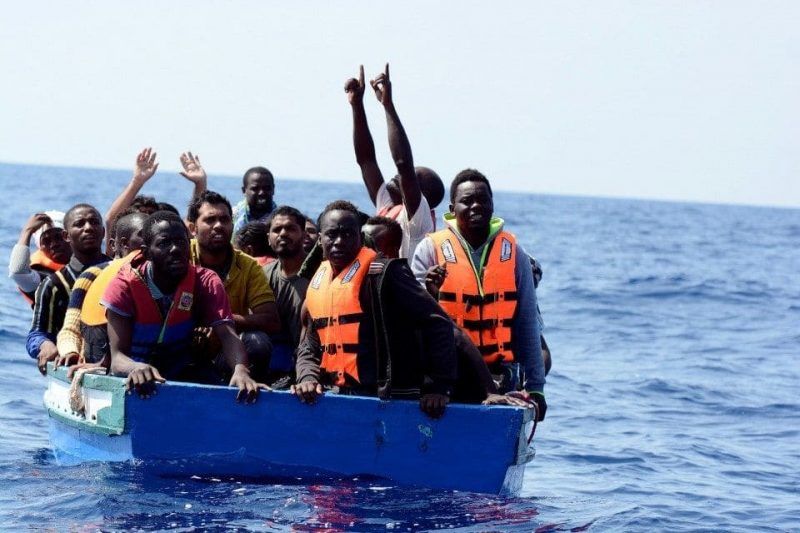
Far from separating families at the border, Europe has been keeping them together at the bottom of the Mediterranean Sea. Since June, more than 800 migrants have drowned while trying to reach Europe.
These migrants are dying not because it’s hard to save them. The Mediterranean is no Thai cave. They’re dying because Europe isn’t allowing them to be saved. As surprising as it sounds, rescue boats are being stopped from conducting rescues.
The European Union has no official search-and-rescue operation. Instead, in recent years private citizens and nongovernmental organizations have taken the lead, buying boats and navigating and monitoring the waters to save people in need. The ship I volunteered on, the Seefuchs, was built in 1958. Among our crew were Hanns, a taxi driver from Munich and a very good cook; Henry, a retired baker; and Franz, our taciturn engineer. We’re amateurs, and this summer our job became harder. During two weeks in June 2017, we intercepted and rescued more than 300 migrants. But this year we couldn’t help anyone. The European Union has tried to stop our operations while handing over search-and-rescue responsibilities to the Libyan coast guard.
On June 28, around dawn, 120 migrants departed Libya in an inflatable boat. After a few hours, their engine malfunctioned and caught fire. A Spanish rescue ship, the Open Arms, wanted to assist but was told by Italian authorities to leave it to the Libyan coast guard. They saved 16 people and brought them back to Libya. The other 100 are “missing” at sea (the search-and-rescue euphemism for “drowned”), except for three babies whose bodies floated back to a Libyan beach.
Still mired in a civil war, the Libyan government doesn’t have control over its land, let alone its sea. How can it possibly take charge of all rescue operations?
For those who are saved, Libya is not a safe harbor for return. On July 8, a tugboat called Vos Thalassa rescued more than 60 migrants. Under the direction of the Libyan coast guard, the ship was going to bring them back to Libya. But the migrants threatened mutiny, forcing the Italian coast guard to intervene. The troublemakers need to be punished, tweeted Italian Transport Minister Danilo Toninelli.
But faced with the prospect of being forced to return to where you fled from, with no possessions — where you could be sold in slave auctions to forced labor camps — wouldn’t you mutiny, too?
It is against international law to send refugees back to a place where they could face danger. And it is against common sense to give the coordination of rescue operations to the half-functional coast guard of a failed state. But European countries are not merely ignoring the people drowning off their shores (drowning as near to Europe as Austin is to Dallas). They are actively stopping other people from helping. Two months ago, Dutch authorities called into question the status of the Seefuchs’s flag, our passport of the sea. Since then, the Seefuchs has been stuck in the harbor of Valletta, Malta.
A week later, Malta impounded another ship, the Lifeline, and brought criminal charges against the captain for supposedly entering Malta’s waters illegally and lacking proper registration. A third ship, Sea Watch 3, is also not being allowed to operate by the authorities. Even a surveillance aircraft used for spotting sinking boats, funded by the German Evangelical Church, is blocked from flying. The Italian deputy prime minister, Matteo Salvini, has called for rescue boats to be sunk.
There are ways to close and control migrant routes without criminalizing rescue work and letting people drown. But many European leaders are either paralyzed by political fears or capitalizing on anti-immigrant sentiments.
On July 15, the Libyan coast guard conducted a rescue operation and returned 158 migrants to their shore. But they inexplicably left behind three people: a mother, her 5-year-old boy and a 40-year-old woman from Cameroon, Josefa. For two days, they were left to float, holding on to their wrecked boat. Around 7:30 a.m. on July 17, the only two operational rescue ships, Open Arms and Astral, approached them. Josefa was still alive and was brought to Spain. But the mother and child had died. They were too late.
Peter Martin has volunteered on three search-and-rescue missions on the Seefuchs. He is a PhD student in ancient history at the University of Cambridge.
